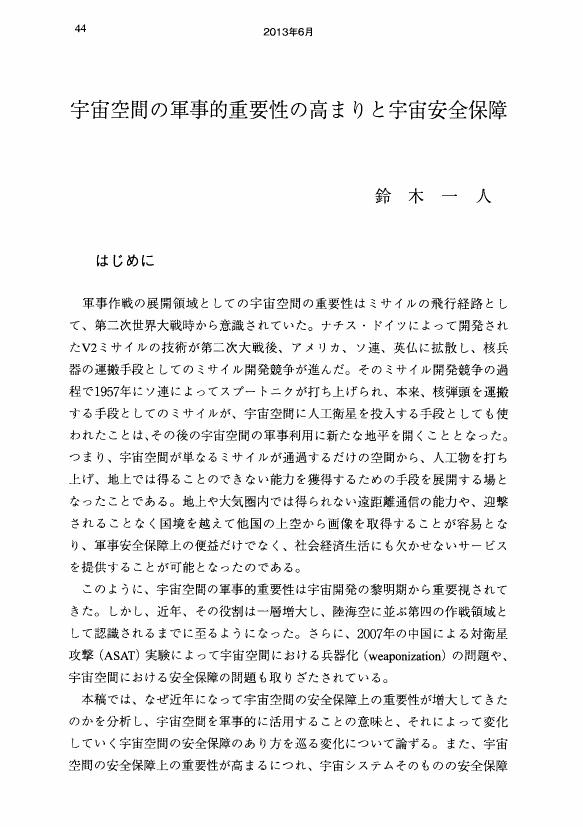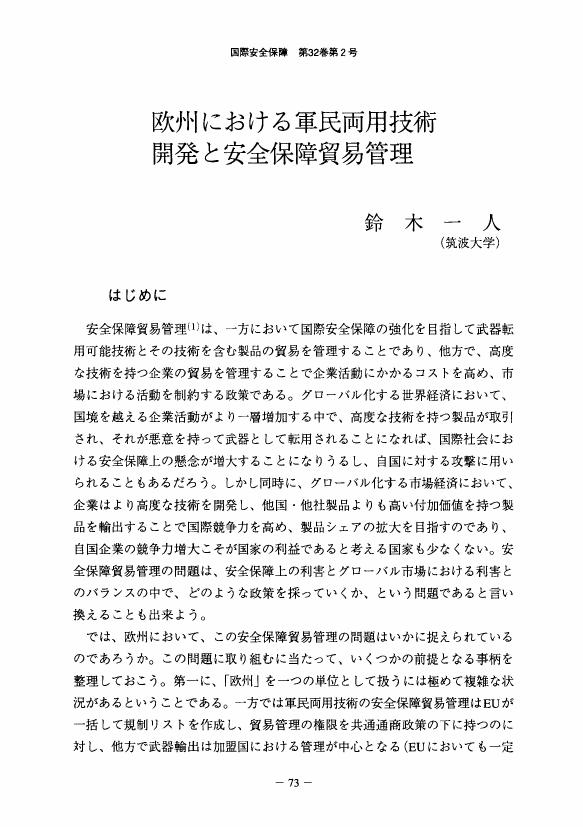13 0 0 0 OA 日米同盟における国際法規範の役割に関する学際研究
- 著者
- 石川 卓 黒崎 将広 鈴木 一人 石井 由梨佳 彦谷 貴子 ワックスマン マシュー 徳地 秀士 彦谷 貴子 リー トマス 那須 仁 クー ジュリアン アダムス マイケル スクーヴィル ライアン
- 出版者
- 防衛大学校(総合教育学群、人文社会科学群、応用科学群、電気情報学群及びシステム工学群)
- 雑誌
- 基盤研究(B)
- 巻号頁・発行日
- 2016-04-01
本研究は、国際法規範がはたして日米同盟の実施運用そしてさらなる強化を支える「共通言語」ないし「共通のロジック」たり得るのかを検討することを目的としたものである。日米豪の専門家集団による3年にわたる検討と意見交換の結果、両国ともに日米同盟の柱となる国際法上の武力行使と自衛権の概念および枠組みを極めて重要なものとして位置づけつつも、国際法および国内法上の武力の意味、ならびに自衛権行使の発動条件および当該行使にかかる行政府(首相・大統領)と立法府(国会・議会)の権限関係といった様々なレベルで大きな違いが存在することが明らかとなった。
12 0 0 0 OA 主権と資本 ―グローバル市場で国家はどこまで自律性を維持出来るのか
- 著者
- 鈴木 一人
- 出版者
- 日本政治学会
- 雑誌
- 年報政治学 (ISSN:05494192)
- 巻号頁・発行日
- vol.70, no.1, pp.1_56-1_75, 2019 (Released:2020-06-21)
- 参考文献数
- 21
主権国家システムと資本主義システムは近代のシステムの両輪として発達した。しかし、ニクソンショックによって変動相場制へと移行したことで自由な資本移動が可能となり、それが主権国家の自律的な経済財政政策を困難にさせるようになってきた。開放経済の下では資本移動の自由と安定した為替と自律的な金融政策の三つが同時に成立しないトリレンマが起こるが、ニクソンショックを契機に加速するグローバルな資本移動が所与のものとなり、不安定な為替に耐えられない多くの国は実質的な自律性を失っていく。また深刻な債務危機に陥った国家はIMFによるコンディショナリティによっても自律性を失っていく。自律性を失いながらも法的な主権を維持し続ける国家は、自らの自律性を回復させる運動として、他国に対する排他的な政策、すなわち保護主義的ないしポピュリスト的な政策を取るようになる。しかし、そうした排他的な政策もそれを実行する能力の有無によって不平等な状況が生まれ、法的な平等性は維持されながらも実質的な自律的統治能力の不平等性が生まれる状況になっている。
2 0 0 0 OA 政策のための「文理融合」とは何か
- 著者
- 鈴木 一人
- 出版者
- 北海道大学公共政策大学院
- 雑誌
- 年報 公共政策学 (ISSN:18819818)
- 巻号頁・発行日
- vol.14, pp.3-12, 2020-03-31
2 0 0 0 OA EUの「資源外交」を巡る戦略とその矛盾
- 著者
- 鈴木 一人
- 出版者
- 北海道大学公共政策大学院 = Hokkaido University Public Policy School
- 雑誌
- 年報 公共政策学 (ISSN:18819818)
- 巻号頁・発行日
- vol.6, pp.139-158, 2012-03-30
This article discusses the chronological development of EU's energy security policy and its problems. Because energy security is primarily a responsibility of national governments, the European Union (European Commission in particular) was not able to formulate unified energy policy. But at the same time, due to the lack of natural energy resources, EU member states needed to cooperate in order to increase bargaining power against energy rich regions such as Middle East or Russia. The problem of international negotiation became clear when Russia and Ukraine increased the political tension, and in order to secure supply of natural gas from Russia, EU launched the discussion with Green Paper which resulted the first comprehensive energy policy in 2007. Furthermore, the "Energy 2020", a new policy document suggested the necessity for EU to influence the process of rules- and standard-making to secure the free trade environment for energy resources. However, the division of competence between member states and EU still make it difficult to formulate comprehensive energy policy. Furthermore, dynamic change of international environment such as "Arab Spring" and Russo-Ukraine conflict, and different reactions and interests of member states complicated the EU strategy for energy rich regions. This structural contradiction of EU's energy security policy implies that EU may not be hegemonic power in international arena, but their role as a giant consumer of energy would have a power to shape international energy market.
1 0 0 0 OA 宇宙空間の軍事的重要性の高まりと宇宙安全保障
- 著者
- 鈴木 一人
- 出版者
- 国際安全保障学会
- 雑誌
- 国際安全保障 (ISSN:13467573)
- 巻号頁・発行日
- vol.41, no.1, pp.44-59, 2013-06-30 (Released:2022-04-07)
1 0 0 0 OA 軍事宇宙インフラにおける民間企業の役割
- 著者
- 鈴木 一人
- 出版者
- 国際安全保障学会
- 雑誌
- 国際安全保障 (ISSN:13467573)
- 巻号頁・発行日
- vol.36, no.2, pp.51-74, 2008-09-30 (Released:2022-04-20)
1 0 0 0 OA フランスとESDP ―「ドゴール=ミッテラン主義」の制度化過程―
- 著者
- 鈴木 一人
- 出版者
- 国際安全保障学会
- 雑誌
- 国際安全保障 (ISSN:13467573)
- 巻号頁・発行日
- vol.34, no.3, pp.25-48, 2006-12-31 (Released:2022-04-20)
1 0 0 0 OA 欧州における軍民両用技術開発と安全保障貿易管理
- 著者
- 鈴木 一人
- 出版者
- 国際安全保障学会
- 雑誌
- 国際安全保障 (ISSN:13467573)
- 巻号頁・発行日
- vol.32, no.2, pp.73-98, 2004-09-30 (Released:2022-04-24)
- 著者
- 鈴木 一人
- 出版者
- 一般財団法人 日本国際政治学会
- 雑誌
- 国際政治 (ISSN:04542215)
- 巻号頁・発行日
- vol.2022, no.207, pp.207_200-207_203, 2022-03-30 (Released:2022-03-31)
1 0 0 0 編集後記
- 著者
- 鈴木 一人
- 出版者
- 一般財団法人 日本国際政治学会
- 雑誌
- 国際政治 (ISSN:04542215)
- 巻号頁・発行日
- vol.2022, no.205, pp.205_188, 2022-02-04 (Released:2022-03-31)
1 0 0 0 検証 エコノミック・ステイトクラフト
- 著者
- 鈴木 一人
- 出版者
- 一般財団法人 日本国際政治学会
- 雑誌
- 国際政治 (ISSN:04542215)
- 巻号頁・発行日
- vol.2022, no.205, pp.205_1-205_13, 2022-02-04 (Released:2022-03-31)
- 参考文献数
- 18
Globalization connects the economic activities of the world even though the world is becoming more contested and confrontational. The rivalry between the US and China increases the political frictions while they are deeply connected through global supply chain. Both the US and China are weaponizing trade relations as if they are at war without shooting a single bullet. The concept of “Economic Statecraft” emerged in such circumstances.A quick definition of the “Economic Statecraft (hereafter, ES)” is “achieving diplomatic and strategic goals of the state by using economic means”. Under this definition, the article examines the measures used in ES such as sanctions, export control, trade restrictions and aid. These measures have different effects on delivering political message to the target state, but they are taken in accordance with the aim and objective of the ES exercising state.The aim and objectives of the states are threefold. First, the ES is used to change the behavior and action of target state. For example, ES can be used for improving human rights conditions or halting nuclear programs by adding economic pressure. Second, ES is effective for announcing the malign activities and setting up norms of behavior. It is a message to add not only economic pressure but social pressure as well. Third, ES may have an effect to improve international and national solidarity and claim its legitimacy for implementing market distorting measures. If a state exercise ES, it may have negative effect on the economy of its own by cutting trade and investment or not licensing the export from its territory.The condition for the success of ES does not depend on the size of economy but the monopoly position in the global supply chain. If other countries have no option but to depend on the product from particular state, that state will have the power to use such a product as a leverage. Also the size of the market may create dependence. States in proximity of a large economy tend to fall into this category. Also state which controls the international currency can use such a position as a leverage.The article also examines the difference between the concepts of “economic security” and ES. The difference is that “economic security” focuses on the defense from economic coercion by improving national autonomy, while ES is an offensive tool for imposing political will on other states.
1 0 0 0 OA 国連イラン制裁の実効性
- 著者
- 鈴木 一人
- 出版者
- 国際安全保障学会
- 雑誌
- 国際安全保障 (ISSN:13467573)
- 巻号頁・発行日
- vol.48, no.2, pp.68-87, 2020-09-30 (Released:2022-03-14)
- 著者
- 鈴木 一人
- 出版者
- 立命館大学
- 雑誌
- 政策科学 (ISSN:09194851)
- 巻号頁・発行日
- vol.8, no.3, pp.113-132, 2001-02
1 0 0 0 OA 蓋を含めた紙製ヨーグルト・カップのLCA
- 著者
- 有間 俊彦 吉田 伸二 鈴木 一人 長谷川 浩 山本 敏克 中川 善博 石井 謙二 伊坪 徳宏
- 出版者
- 日本LCA学会
- 雑誌
- 日本LCA学会研究発表会講演要旨集 第7回日本LCA学会研究発表会
- 巻号頁・発行日
- pp.38, 2011 (Released:2012-02-16)
紙製ヨーグルト・カップは本体には紙、蓋にはアルミニウムが主に使用されている。本研究では、こうした紙製ヨーグルト・カップのLCAをLIME2を使用して実施した(ヨーグルトの充填及び封緘プロセスは除く)。アルミの環境負荷は相対的に大きく、木材が環境(一次生産及び生物多様性)に与える影響がゼロであるとした場合、容器1個が環境に与える影響(統合化)の50%強が蓋に由来し、その殆どが素材製造に由来している。
1 0 0 0 宇宙技術の汎用化に伴う国際政治経済構造の変容
本年度は中国における宇宙開発を中心に研究を進める予定であったが、昨年度に引き続き、本年度の前半はアメリカ・プリンストン大学の国際地域研究所への長期出張が継続しており、現地で最新の国際政治学の研究に触れながら、グローバル・コモンズとしての宇宙空間のガバナンスについての研究を行った。しかし、本年度の途中で国際連合安全保障理事会の下にある1737委員会(通称イラン制裁委員会)の専門家パネルの専門家として任命されることとなり、やむなく本研究に対する補助金の廃止を申請することとなった。とはいえ、本年度も多くの研究成果が残すことが出来た。宇宙関連の政官学の主要人物が世界中から集まるアメリカのNational Space Symposiumで本研究の報告をすることが出来たほか、ヨーロッパ研究の世界最高峰と言われるEuropean Union Studies Associationで宇宙のグローバルガバナンスにおけるEUの役割について報告したほか、日本EU学会においても、共通論題の報告者として本研究の成果を発表した。また、インドのマニパル大学において、日印戦略対話の一環として、インドとの宇宙協力の問題について議論し、新興国であるインドと日本の関係について論じた。著作としては『国際安全保障』に「宇宙空間の軍事的重要性の高まりと宇宙安全保障」として、宇宙空間のガバナンス問題を取り上げ、途上国・新興国の台頭に伴うルール作りの必要性を論じた。また、外務省の外郭団体である国際問題研究所のグローバル・コモンズと日米同盟プロジェクトに参加し、その報告書の原稿(近刊予定)を執筆し、ミネルヴァ書房から出された『国際関係・安全保障用語辞典』の宇宙関連の項目を合計11項目担当した。
1 0 0 0 OA EUの「資源外交」を巡る戦略とその矛盾
- 著者
- 鈴木 一人
- 出版者
- 北海道大学公共政策大学院 = Hokkaido University Public Policy School
- 雑誌
- 年報 公共政策学 (ISSN:18819818)
- 巻号頁・発行日
- vol.6, pp.139-158, 2012-03-30
This article discusses the chronological development of EU's energy security policy and its problems. Because energy security is primarily a responsibility of national governments, the European Union (European Commission in particular) was not able to formulate unified energy policy. But at the same time, due to the lack of natural energy resources, EU member states needed to cooperate in order to increase bargaining power against energy rich regions such as Middle East or Russia. The problem of international negotiation became clear when Russia and Ukraine increased the political tension, and in order to secure supply of natural gas from Russia, EU launched the discussion with Green Paper which resulted the first comprehensive energy policy in 2007. Furthermore, the "Energy 2020", a new policy document suggested the necessity for EU to influence the process of rules- and standard-making to secure the free trade environment for energy resources. However, the division of competence between member states and EU still make it difficult to formulate comprehensive energy policy. Furthermore, dynamic change of international environment such as "Arab Spring" and Russo-Ukraine conflict, and different reactions and interests of member states complicated the EU strategy for energy rich regions. This structural contradiction of EU's energy security policy implies that EU may not be hegemonic power in international arena, but their role as a giant consumer of energy would have a power to shape international energy market.
- 著者
- 鈴木 一人
- 出版者
- 日本国際政治学会
- 雑誌
- 国際政治 (ISSN:04542215)
- 巻号頁・発行日
- no.162, pp.9-23, 2010-12
1 0 0 0 OA 欧州連合の対テロ政策の枠組み
- 著者
- 鈴木 一人
- 出版者
- 北海道大学大学院法学研究科
- 雑誌
- 北大法学論集 (ISSN:03855953)
- 巻号頁・発行日
- vol.60, no.2, pp.121-142, 2009-07-31





